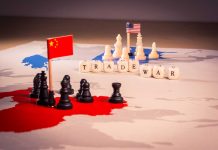
President Zelenskyy rejects a US-proposed rare earth minerals deal, citing lack of security guarantees for Ukraine.
At a Glance
- Ukraine is interested in a minerals agreement with the US, but security guarantees are a crucial condition.
- The US proposal sought 50% rights to Ukraine’s rare earth minerals, which Zelenskyy refused to accept.
- Zelenskyy emphasizes the need for NATO-like security guarantees in any economic partnership.
- US officials view the deal as a way to repay American taxpayers and ensure lasting partnership.
- The agreement’s rejection highlights the complexities of international negotiations amid ongoing conflict.
Zelenskyy’s Standpoint: Security First
In a move that has raised eyebrows in Washington, Ukrainian President Volodymyr Zelenskyy has put the brakes on a potentially game-changing economic agreement with the United States. The deal, which would grant the US access to Ukraine’s coveted rare earth minerals, has been met with reluctance from Kyiv, primarily due to what Zelenskyy perceives as inadequate security assurances for his war-torn nation.
Zelenskyy’s cautious approach underscores the delicate balance Ukraine must strike between economic opportunities and national security. While the agreement could potentially inject much-needed investment into Ukraine’s economy, the absence of concrete security guarantees has left the Ukrainian leader wary of committing to such a significant deal.
The Proposal: Economic Partnership or Resource Grab?
The proposed agreement, as presented by US Treasury Secretary Scott Bessent, would see Ukraine transfer rights to 50% of its rare earth minerals to the United States. These minerals, crucial for various high-tech applications, represent a significant economic asset for Ukraine. However, the terms of the deal have raised concerns about the long-term implications for Ukraine’s sovereignty and resource control.
Zelenskyy’s insistence on security guarantees reflects a broader strategy to ensure Ukraine’s long-term stability and protection against potential future aggressions. The Ukrainian president has emphasized the need for a security system analogous to NATO, should Ukraine remain outside the alliance.
Ukraine proposes that the United States, along with designated partners—including the European Union, which Ukraine will be a part of—and other global partners, sign a special agreement for the joint protection of Ukraine’s critical resources, as well as joint investment in and…
— Volodymyr Zelenskyy / Володимир Зеленський (@ZelenskyyUa) October 16, 2024
US Perspective: A Missed Opportunity?
From the US standpoint, the proposed deal is seen as a strategic method to recompense American taxpayers for their support of Ukraine during the ongoing conflict with Russia. Some US officials have expressed frustration with Zelenskyy’s reluctance, viewing it as a shortsighted decision that could jeopardize a lasting partnership between the two nations.
The US has indicated willingness to deploy troops to Ukraine to protect the minerals, contingent on a peace deal with Russia. This offer, while potentially addressing some security concerns, still falls short of the comprehensive guarantees Zelenskyy seeks.
Implications for Future Negotiations
Zelenskyy’s stance on the minerals deal sheds light on the complexities of international negotiations in the context of ongoing conflict. It underscores the importance Ukraine places on being an active participant in any discussions about its future, rather than having decisions made “behind its back.”
As negotiations continue, finding a balance between economic opportunities and security guarantees will be crucial. The outcome of these discussions could set a precedent for how resource-rich nations in vulnerable geopolitical positions navigate partnerships with global powers.






















